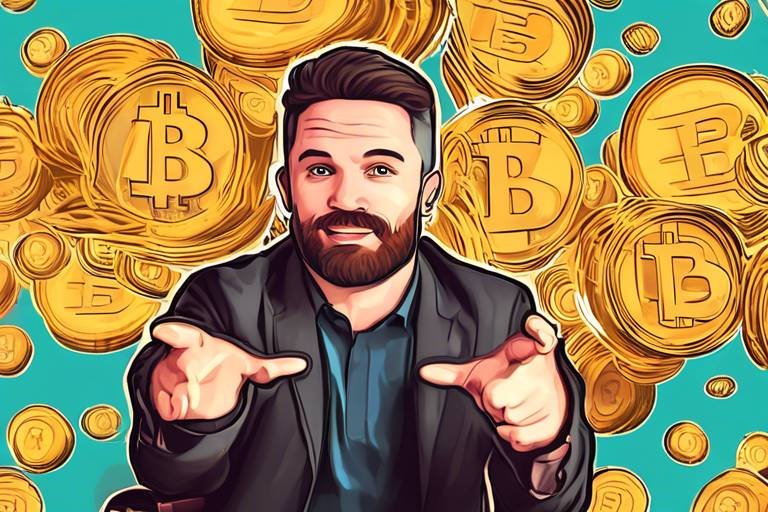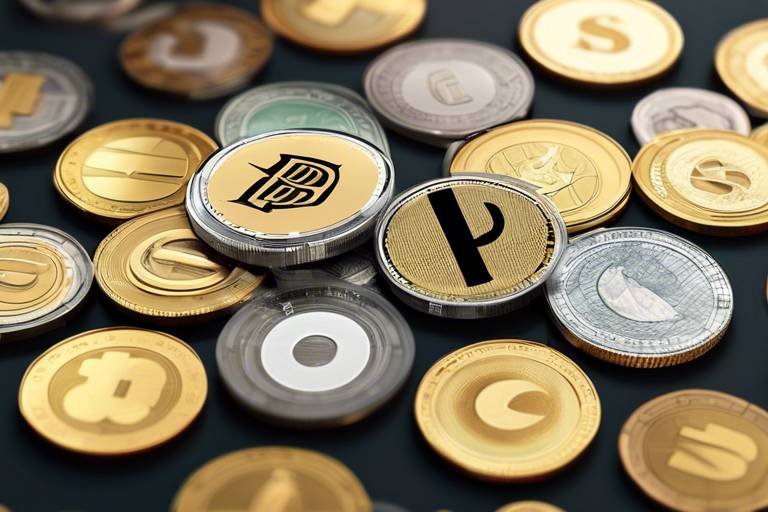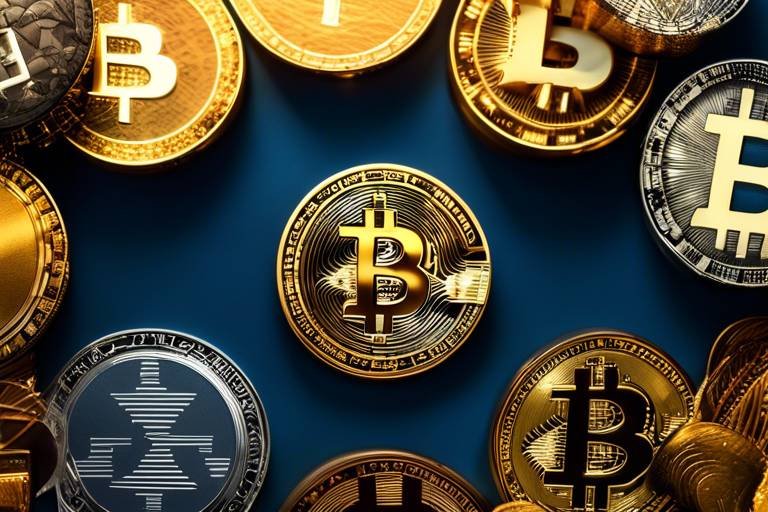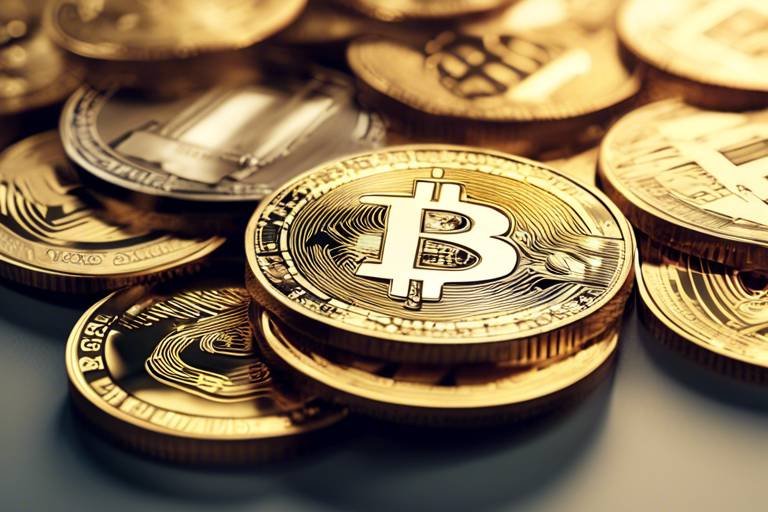The Rise of Social Tokens - Monetizing Online Communities
In the ever-evolving digital landscape, where online communities are flourishing like never before, a new phenomenon is taking center stage: social tokens. These digital assets are not just a passing trend; they represent a fundamental shift in how creators and communities interact, engage, and monetize their presence in the online world. Imagine a world where your favorite content creator can directly reward their most loyal fans, or where community members can earn tangible benefits for their contributions. This is the essence of social tokens—a revolutionary method for monetizing online communities.
At its core, a social token is a digital asset that signifies ownership or access within a specific community. Unlike traditional cryptocurrencies that serve as a medium of exchange, social tokens are often tailored to represent a unique value proposition within a particular ecosystem. They can be used to unlock exclusive content, access special events, or even participate in governance decisions—essentially giving community members a stake in the group they belong to. As we delve deeper into the world of social tokens, it becomes clear that they are not only reshaping the way we think about digital interactions but also paving the way for a new era of community-driven economies.
As we explore the benefits of social tokens, it’s crucial to understand the myriad ways they can enhance engagement, foster loyalty, and provide direct monetization opportunities for creators. These tokens are not just about financial transactions; they are about building relationships and creating a sense of belonging. In a world where digital interactions often feel impersonal, social tokens offer a way to bridge that gap, making online communities more vibrant and interactive.
However, like any innovative concept, the rise of social tokens is not without its challenges. From navigating regulatory landscapes to dealing with market volatility, creators and communities must tread carefully as they adopt this model. The potential is immense, but so are the obstacles that lie ahead. As we look to the future, it’s essential to consider how these challenges will shape the evolution of social tokens and their role in the broader digital economy.
- What are social tokens? Social tokens are digital assets that represent ownership or access within a specific online community.
- How do social tokens differ from traditional cryptocurrencies? Unlike cryptocurrencies that are primarily used for transactions, social tokens are designed to enhance community engagement and provide unique benefits to members.
- What are the benefits of using social tokens? They enhance community engagement, foster loyalty, and provide direct monetization opportunities for creators.
- What challenges do creators face with social tokens? Challenges include regulatory hurdles and market volatility that can affect the stability and value of the tokens.
- What does the future hold for social tokens? The future appears promising, with trends suggesting increased adoption and innovative uses of social tokens in various online communities.

[Understanding Social Tokens]
Social tokens are a fascinating innovation in the realm of digital assets, representing a unique blend of community engagement and financial opportunity. Essentially, these tokens serve as a digital currency within specific communities, granting holders various rights and privileges that enhance their experience and participation. Unlike traditional cryptocurrencies like Bitcoin or Ethereum, which are primarily designed for trading and investment, social tokens are tailored for community interaction and engagement. They can be used to access exclusive content, participate in special events, or even vote on community decisions, creating a sense of ownership and belonging among members.
The purpose of social tokens extends beyond mere transactions; they aim to cultivate relationships between creators and their audiences. By aligning the interests of both parties, social tokens empower creators to monetize their content directly while simultaneously rewarding their most loyal supporters. This creates a win-win scenario where the community thrives, and creators can sustain their work financially. The beauty of social tokens lies in their ability to transform passive followers into active participants, fostering a vibrant ecosystem that thrives on collaboration and mutual support.
One of the key distinctions between social tokens and traditional cryptocurrencies is their utility. While cryptocurrencies often serve as a means of exchange or store of value, social tokens are designed with specific functionalities in mind. For instance, holders of a social token may gain access to exclusive merchandise, behind-the-scenes content, or even one-on-one interactions with creators. This level of engagement is unprecedented and can significantly enhance the overall experience within a community.
To illustrate the concept further, consider the following table that highlights the main differences between social tokens and traditional cryptocurrencies:
| Aspect | Social Tokens | Traditional Cryptocurrencies |
|---|---|---|
| Purpose | Community engagement and rewards | Investment and trading |
| Utility | Access to exclusive content and experiences | Medium of exchange |
| Ownership | Fosters community ownership | Ownership of digital assets |
| Value Proposition | Strengthens creator-audience relationships | Speculative value |
As we dive deeper into the world of social tokens, it's essential to grasp their implications on community dynamics. These tokens not only serve as a financial instrument but also as a catalyst for enhanced interaction and community building. The more engaged members feel, the more likely they are to contribute positively, leading to a thriving ecosystem where everyone benefits. In this new paradigm, social tokens are not just a trend; they are paving the way for a more interconnected and participatory digital landscape.

[Benefits of Social Tokens]
The rise of social tokens has opened up a new frontier for creators and their communities, offering a plethora of unique advantages that traditional monetization methods simply can't match. Imagine being able to turn your passion into profit while simultaneously fostering a sense of belonging and loyalty among your audience. Social tokens achieve exactly that by creating a direct line of engagement between creators and their supporters. But what are the specific benefits that make social tokens so appealing? Let's dive in!
One of the most significant advantages of social tokens is their ability to enhance community engagement. When members of a community feel that they have a stake in the platform—thanks to their ownership of social tokens—they are more likely to participate actively. This engagement can manifest in various ways, such as:
- Participating in discussions
- Creating content
- Sharing feedback
By rewarding these contributions with tokens, creators can cultivate a vibrant atmosphere where everyone feels valued and heard. This not only improves the quality of interactions but also strengthens the community's overall cohesion.
Another remarkable benefit is the potential for direct monetization opportunities. Unlike traditional platforms where creators often rely on ad revenue or sponsorship deals, social tokens enable creators to monetize their content in a more straightforward manner. For instance, creators can:
- Sell tokens directly to fans, granting them exclusive access to content or experiences
- Implement membership models where token holders receive special perks
- Launch token-based crowdfunding campaigns for new projects
This direct approach to monetization not only empowers creators but also allows them to build a sustainable income model based on their community's support.
Moreover, social tokens foster **loyalty** among community members. When individuals own tokens, they feel a deeper connection to the creator and the community as a whole. It's akin to owning a piece of the brand—this sense of ownership can lead to long-term commitment and active participation. As members invest their time and resources into the community, they are more likely to advocate for it, bringing in new members and enhancing its overall growth.
In summary, the benefits of social tokens are multifaceted, encompassing enhanced engagement, direct monetization opportunities, and the cultivation of loyalty. These elements work synergistically to create a thriving ecosystem where creators and their communities can flourish together. As we move forward, it’s clear that social tokens are not just a passing trend; they represent a fundamental shift in how we think about online interactions and value creation.
Q1: What are social tokens?
Social tokens are digital assets that represent ownership or access within a community, allowing members to participate actively and benefit from their contributions.
Q2: How do social tokens enhance community engagement?
By rewarding members with tokens for their contributions, social tokens create a more interactive and vibrant community atmosphere.
Q3: Can creators monetize their content directly with social tokens?
Yes, creators can sell tokens, implement membership models, and launch crowdfunding campaigns, providing various avenues for revenue generation.
Q4: What role do social tokens play in fostering loyalty?
Ownership of social tokens strengthens the bond between creators and their audiences, leading to long-term commitment and advocacy for the community.

[Enhanced Community Engagement]
In the digital age, where online interactions often feel fleeting and impersonal, social tokens emerge as a beacon of hope for enhancing community engagement. Imagine a vibrant online community where each member feels valued, their contributions recognized, and their voices heard. This is precisely what social tokens aim to achieve. By rewarding members for their active participation, communities can transform from passive forums into dynamic ecosystems where engagement flourishes.
One of the key ways social tokens drive engagement is through the concept of reward systems. When community members know they can earn tokens for their contributions—be it through creating content, sharing insights, or participating in discussions—they are more likely to engage actively. This creates a ripple effect: the more people participate, the richer the community becomes. For instance, a community focused on art might reward members with tokens for sharing their artwork or providing constructive feedback, which in turn motivates others to join in.
The beauty of social tokens lies in their ability to incentivize contributions. Think of it like a loyalty program at your favorite coffee shop. Just as you earn points for every cup you buy, social tokens allow members to accumulate value through their interactions. This incentivization can take various forms, including:
- Exclusive Content: Token holders might gain access to premium content, such as tutorials, webinars, or behind-the-scenes looks.
- Voting Rights: Members could use tokens to vote on community decisions, giving them a voice in shaping the direction of the community.
- Special Events: Token rewards might include invitations to exclusive events, both online and offline, fostering deeper connections among members.
Additionally, social tokens can help build loyalty between creators and their audiences. When members own tokens, they have a stake in the community's success. This ownership fosters a sense of belonging and commitment, as members are more likely to support creators whose tokens they hold. It's like being part of a club where you not only enjoy the benefits but also contribute to its growth. The emotional connection formed through token ownership can lead to a more engaged and dedicated community.
In summary, social tokens are not just digital assets; they are a powerful tool for enhancing community engagement. By rewarding participation, incentivizing contributions, and fostering loyalty, social tokens create a vibrant atmosphere where members feel empowered and valued. As communities embrace this innovative model, we can expect to see a shift towards more interactive and rewarding online experiences. The question remains: how will your community leverage social tokens to transform engagement?

[Incentivizing Contributions]
In the vibrant world of online communities, incentivizing contributions has become a game-changer. Imagine a bustling marketplace where every voice matters, and every contribution is rewarded. Social tokens act as the currency that fuels this marketplace, encouraging members to participate actively. By implementing a token-based reward system, communities can create an environment where members feel valued and motivated to share their insights, ideas, and creativity.
One effective strategy for incentivizing participation is to establish a tiered reward system. For instance, community members can earn social tokens based on their level of engagement. The more they contribute—whether through creating content, participating in discussions, or helping others—the more tokens they accumulate. This not only fosters a sense of accomplishment but also transforms the community into a dynamic ecosystem where everyone has a stake in its success.
To illustrate this concept, consider the following table that outlines a potential tiered reward system:
| Engagement Level | Activity Type | Tokens Earned |
|---|---|---|
| Bronze | Commenting on posts | 5 Tokens |
| Silver | Creating a new post | 15 Tokens |
| Gold | Hosting a community event | 30 Tokens |
This tiered approach not only highlights the value of different types of contributions but also encourages members to strive for higher engagement levels. Furthermore, the use of social tokens creates a sense of ownership among community members. When individuals hold tokens, they are more likely to feel a connection to the community's mission and goals. This connection can lead to increased loyalty and a stronger desire to contribute, as members recognize that their efforts directly impact the community's growth and success.
Moreover, social tokens can be utilized in creative ways to incentivize contributions. For instance, communities can host competitions or challenges where members can earn tokens for completing specific tasks or achieving certain milestones. This not only gamifies the experience but also fosters a spirit of collaboration and healthy competition among members. When people are motivated by the prospect of earning tokens, they are more likely to engage actively, share their knowledge, and support one another.
In conclusion, incentivizing contributions through social tokens is a powerful way to cultivate a thriving community. By rewarding engagement, establishing tiered systems, and fostering a sense of ownership, creators can transform their online spaces into dynamic hubs of activity. As the landscape of digital interactions continues to evolve, the role of social tokens in motivating participation will undoubtedly play a pivotal role in shaping the future of online communities.
- What are social tokens? Social tokens are digital assets that represent ownership or access within a community, allowing for unique monetization and engagement opportunities.
- How do social tokens incentivize contributions? By rewarding members with tokens for their participation, communities can encourage more active engagement and foster loyalty among their members.
- Are there risks associated with social tokens? Yes, challenges such as market volatility and regulatory considerations can pose risks for both creators and community members.
- What is the future of social tokens? The future looks promising, with potential mainstream adoption and innovative developments on the horizon.

[Building Loyalty]
In the digital age, where attention spans are shorter than ever, building loyalty within an online community has become an art form. Social tokens serve as a powerful tool in this endeavor, creating a unique bond between creators and their audience. Imagine a world where your favorite creator not only acknowledges your support but also rewards you for it. This is the essence of social tokens—they transform casual followers into dedicated advocates.
When community members hold social tokens, they gain a sense of ownership and belonging. This ownership is akin to having a stake in a company; it fosters a deeper connection. Members are no longer just passive consumers; they become active participants in the community's growth. The more tokens they hold, the more they feel invested in the community's success. This emotional investment can lead to increased loyalty, as members are more likely to stick around and support the creator’s endeavors.
Moreover, social tokens can facilitate exclusive access to content, events, or experiences that are not available to non-token holders. For instance, a musician might offer a private concert for token holders, or a content creator could provide behind-the-scenes access to their creative process. Such exclusivity not only enhances the value of the tokens but also strengthens the community's bond. Members feel special and appreciated, which can significantly boost their loyalty.
To further cultivate loyalty, creators can implement tiered rewards systems based on the number of tokens held. For example, a creator might offer different levels of perks, such as:
- Bronze Tier: Access to exclusive content and early releases.
- Silver Tier: Participation in Q&A sessions and community polls.
- Gold Tier: One-on-one interactions and personalized content.
This tiered approach not only incentivizes members to increase their token holdings but also creates a sense of achievement and recognition. As members ascend through the tiers, they feel a greater sense of loyalty to the creator and the community, often leading to organic promotion and recruitment of new members.
In conclusion, social tokens are not just a means of monetization; they are a revolutionary way to build and maintain loyalty within online communities. By fostering a sense of ownership, providing exclusive access, and implementing tiered rewards, creators can cultivate a loyal fanbase that feels valued and engaged. As we move further into the digital age, the importance of loyalty in sustaining communities cannot be overstated, and social tokens are paving the way for this new paradigm.
- What are social tokens? Social tokens are digital assets that grant holders access to exclusive content, experiences, or benefits within a community.
- How do social tokens build loyalty? They create a sense of ownership and belonging, rewarding members for their participation and support.
- Can anyone create social tokens? Yes, anyone can create social tokens, but navigating the legal and regulatory landscape is essential.
- What are the risks associated with social tokens? Market volatility and regulatory challenges can pose risks for both creators and token holders.

[Direct Monetization Opportunities]
In the ever-evolving digital landscape, social tokens have emerged as a groundbreaking way for creators to monetize their content directly. Imagine being able to turn your passion into profit while simultaneously building a thriving community around it. This is the promise of social tokens! By leveraging these unique digital assets, creators can explore various revenue streams that were previously unimaginable.
One of the most straightforward methods for monetizing through social tokens is by launching token sales. Creators can issue their own tokens, which can be purchased by fans and community members. This not only provides immediate funding but also gives token holders a sense of ownership and investment in the creator’s journey. Think of it as a modern-day version of crowdfunding, where supporters can buy into the future potential of a creator's work.
Another exciting avenue is the implementation of membership models. With social tokens, creators can establish exclusive tiers of access based on token ownership. For instance, a musician might offer special behind-the-scenes content, early access to new releases, or even private concerts for token holders. This creates a more intimate relationship between creators and their fans, fostering a sense of community while providing a steady income stream.
To illustrate the potential of these monetization methods, consider the following table, which outlines various monetization strategies using social tokens:
| Monetization Method | Description | Benefits |
|---|---|---|
| Token Sales | Creators sell tokens directly to fans. | Immediate funding, community investment. |
| Membership Models | Exclusive content and experiences based on token ownership. | Enhanced engagement, loyal fanbase. |
| Merchandise Discounts | Token holders receive discounts on merchandise. | Increased sales, token utility. |
| Access to Events | Special access to live events or online meet-and-greets. | Strengthened community ties, unique experiences. |
Moreover, the concept of tokenized rewards can also be a game changer. Communities can create systems where members earn tokens for their contributions, such as creating content, sharing insights, or participating in discussions. These tokens can then be redeemed for exclusive rewards, further encouraging engagement and participation. It's like a loyalty program on steroids, where the more you contribute, the more you earn!
However, it's essential to approach these monetization strategies with a clear understanding of your community's needs and interests. Engaging with your audience to tailor offerings that resonate with them can significantly enhance the effectiveness of these monetization methods. After all, a thriving community is built on mutual benefit and shared goals.
- What are social tokens? Social tokens are digital assets that represent ownership or access within a community, allowing creators to monetize their content directly.
- How can I create my own social token? You can create your own social token using blockchain platforms that support token creation, such as Ethereum or Binance Smart Chain.
- What are the benefits of using social tokens? Social tokens enhance community engagement, provide direct monetization opportunities, and foster loyalty among members.
- Are there risks associated with social tokens? Yes, risks include market volatility and regulatory challenges, which creators must navigate carefully.

[Challenges of Implementing Social Tokens]
While the rise of social tokens presents exciting opportunities, it is essential to recognize that implementing them is not without its challenges. One of the primary hurdles is the regulatory landscape surrounding cryptocurrencies and digital assets. As governments and regulatory bodies worldwide strive to keep pace with the rapid evolution of blockchain technology, creators of social tokens must navigate a complex web of laws and regulations. This can lead to uncertainty, as different jurisdictions may impose varying requirements, making it difficult for creators to ensure compliance. For instance, some countries may classify social tokens as securities, thereby subjecting them to stringent regulations that could hinder their adoption.
Another significant concern is market volatility. The value of social tokens can fluctuate dramatically based on market conditions, which can create a rollercoaster experience for both creators and community members. Imagine investing your time and resources into a token only to see its value plummet overnight due to market whims. This unpredictability can deter potential investors and participants, as they may be hesitant to engage with a system that lacks stability. The implications of such volatility extend beyond individual tokens; they can also affect the overall health of the community, as members may feel less inclined to engage if they perceive that their investments are at risk.
Moreover, the technical barriers associated with launching and managing social tokens can be daunting. Many creators may not possess the technical expertise required to develop a robust token economy, which can lead to poorly designed systems that fail to attract or retain users. This complexity can also result in security vulnerabilities, exposing communities to risks such as hacking or fraud. To mitigate these challenges, it is essential for creators to collaborate with experienced developers and legal advisors who can help navigate the intricacies of token creation and management.
In summary, while social tokens hold immense potential for monetizing online communities, they come with a set of challenges that must be addressed. From regulatory hurdles to market volatility and technical barriers, creators need to be prepared for the multifaceted nature of this innovative approach. As the landscape continues to evolve, overcoming these challenges will be crucial for the success and sustainability of social tokens in the digital economy.
- What are social tokens? Social tokens are digital assets that grant ownership or access within a specific community, allowing creators to monetize their content and engage their audience.
- What are the main challenges of implementing social tokens? Key challenges include navigating regulatory requirements, dealing with market volatility, and overcoming technical barriers in token creation and management.
- How can creators mitigate the risks associated with social tokens? Collaborating with legal and technical experts can help creators design compliant and secure token economies, reducing the risks of volatility and regulatory issues.

[Regulatory Considerations]
When diving into the world of social tokens, one cannot overlook the intricate web of regulatory considerations that come into play. As these digital assets gain traction, governments and regulatory bodies worldwide are scrambling to catch up, creating a complex landscape for creators and communities alike. The primary concern revolves around whether social tokens are classified as securities, which could subject them to stringent regulations. This classification hinges on various factors, including how the token is marketed and its intended use.
For instance, if a social token is sold with the expectation of profit based on the efforts of others, it might fall under the Howey Test, a legal standard used in the United States to determine what constitutes a security. This could mean that creators would need to comply with registration requirements, which can be daunting for those just starting out. Moreover, these regulations can vary significantly from one jurisdiction to another, leading to confusion and uncertainty for creators trying to navigate the legal waters.
Additionally, the issue of taxation plays a crucial role in the regulatory landscape. Depending on the country, the sale or exchange of social tokens could trigger capital gains taxes, which can be a hefty burden for creators and community members. Understanding the tax implications is essential for anyone looking to monetize their community through social tokens.
Furthermore, anti-money laundering (AML) and know your customer (KYC) regulations are becoming increasingly important in the crypto space. Many jurisdictions require platforms dealing with social tokens to implement strict KYC protocols to verify the identity of users. This can create friction, as community members may be hesitant to share personal information, potentially stifling participation.
In summary, while the potential for social tokens is immense, creators must tread carefully and stay informed about the evolving regulatory landscape. Engaging with legal experts and staying updated on regulations will be crucial for anyone looking to harness the power of social tokens without running afoul of the law. The journey may be challenging, but with the right knowledge and resources, it is possible to navigate these waters successfully.
- What are social tokens? Social tokens are digital assets that represent ownership or access within a community, allowing creators to monetize their content and engage their audience.
- How do I know if my social token is a security? Generally, if your token is marketed with the expectation of profit based on the efforts of others, it may be classified as a security under the Howey Test.
- What are the tax implications of selling social tokens? Tax implications can vary by jurisdiction, but selling or exchanging social tokens may trigger capital gains taxes.
- Are there KYC requirements for social tokens? Yes, many jurisdictions require platforms dealing with social tokens to implement KYC protocols to verify user identities.

[Market Volatility]
When it comes to social tokens, one of the most pressing concerns is market volatility. Just like a rollercoaster ride, the value of these tokens can swing dramatically, leaving both creators and community members feeling exhilarated one moment and anxious the next. This unpredictability can create a sense of instability, making it challenging for communities to plan and strategize effectively. For instance, if a token’s value plummets overnight, a creator's financial model could be thrown into disarray, potentially jeopardizing their projects and the community's trust.
Moreover, the fluctuating nature of social tokens can deter potential investors and participants. Imagine walking into a store where the prices change every minute; would you feel confident making a purchase? Similarly, if individuals perceive social tokens as risky investments, they may hesitate to engage or buy in, stifling community growth. This becomes particularly critical when we consider that many creators rely on consistent token value to fund their initiatives, pay for services, or reward their loyal supporters.
To illustrate the impact of market volatility, let's take a look at a hypothetical scenario:
| Month | Token Value (USD) | Community Engagement Level |
|---|---|---|
| January | $10 | High |
| February | $5 | Medium |
| March | $15 | High |
| April | $3 | Low |
As depicted in the table above, the drastic fluctuations in token value correlate with the community's engagement levels. When the token was valued at $10 and $15, members were actively participating and contributing. However, once the value dropped to $3, engagement plummeted. This correlation emphasizes the need for creators to establish mechanisms that can mitigate the effects of volatility, such as creating a stablecoin-like environment or implementing buy-back programs to help stabilize token value.
Furthermore, the emotional toll of market volatility cannot be overlooked. Community members may feel a sense of betrayal if they invest time and resources only to see their tokens lose value. This can lead to a fractured community, where trust erodes and participation dwindles. Hence, it is vital for creators to communicate transparently about the potential risks associated with social tokens. By fostering an open dialogue and setting realistic expectations, creators can help alleviate some of the anxiety that comes with market fluctuations.
In conclusion, while market volatility presents significant challenges for social tokens, it also offers an opportunity for creators to innovate and find solutions that enhance stability and trust within their communities. By addressing these concerns head-on and developing strategies to manage volatility, the future of social tokens could be brighter than ever.
- What are social tokens? Social tokens are digital assets that represent ownership or access within a community, allowing creators to monetize their content and engage with their audience.
- How does market volatility affect social tokens? Market volatility can lead to drastic changes in token value, impacting community engagement and the financial stability of creators.
- What strategies can creators use to mitigate volatility? Creators can implement buy-back programs, establish stablecoin-like environments, and maintain transparent communication with their communities.
- Are social tokens a good investment? Like any investment, social tokens carry risks. It's essential to research and understand the community and its potential before investing.

[The Future of Social Tokens]
The evolution of social tokens is just beginning, and the potential for mainstream adoption is nothing short of exciting. As we look ahead, we can see that social tokens are not merely a passing trend; they represent a fundamental shift in how communities interact and monetize their digital presence. Imagine a world where your favorite content creators can directly reward their most loyal fans, where every interaction is not just a click but a transaction that benefits both parties. This is the future that social tokens are paving the way for.
One of the most promising developments is the integration of social tokens into existing platforms. Major social media networks are beginning to recognize the value of these tokens, and we may soon see features that facilitate token transactions directly within apps. This could lead to a seamless experience where users can earn tokens for their contributions, which they can then use to access exclusive content or even trade for other cryptocurrencies. It’s like turning your social media interactions into a form of currency, adding a layer of value to every post and comment.
Moreover, as communities grow and become more engaged, the possibilities for collaboration expand. Creators can team up with one another, pooling their social tokens to create joint ventures or collaborative projects that benefit both their audiences. This collaborative spirit not only enhances the community experience but also opens up new revenue streams. Imagine a group of artists launching a collective album where fans can purchase social tokens granting them exclusive behind-the-scenes content and early access to releases. This kind of synergy could redefine how we think about community-driven projects.
However, with great potential comes the need for responsibility. The future of social tokens will also require a focus on education and transparency. As more people enter the space, understanding the intricacies of how social tokens work will be crucial. Creators must be prepared to educate their communities about the value of these tokens and how to engage with them safely. This might involve creating resources, webinars, or even community forums dedicated to discussing best practices and sharing insights.
In addition, the landscape of social tokens is likely to be influenced by technological advancements. The rise of decentralized finance (DeFi) and non-fungible tokens (NFTs) could intersect with social tokens, creating hybrid models that enhance their utility. For instance, imagine a scenario where social tokens can be staked to earn rewards, or where they can be tied to unique digital collectibles that represent a creator's brand. These innovations could greatly enhance user engagement and create a more vibrant ecosystem.
As we consider the future, it’s also essential to acknowledge the challenges that lie ahead. Regulatory frameworks will need to evolve to accommodate the unique nature of social tokens, ensuring that creators and users are protected while still allowing for innovation. Furthermore, the volatility of token markets must be addressed to build trust among community members. A stable token economy will encourage more users to participate, fostering a healthier ecosystem.
In conclusion, the future of social tokens is bright and full of potential. As communities continue to embrace this innovative model, we can expect to see a surge in creativity, collaboration, and direct monetization opportunities. The journey is just beginning, and it will be fascinating to witness how social tokens reshape the digital landscape in the years to come.
- What are social tokens? Social tokens are digital assets that represent ownership or access within a community, allowing creators to monetize their content directly.
- How can social tokens benefit creators? They enhance engagement, foster loyalty, and provide direct monetization opportunities through various models.
- What challenges do social tokens face? Key challenges include regulatory hurdles, market volatility, and the need for community education on their use.
- What is the future of social tokens? The future looks promising, with potential for integration into existing platforms, collaboration among creators, and technological advancements.
Frequently Asked Questions
- What are social tokens?
Social tokens are digital assets that represent ownership or access within a specific community. They differ from traditional cryptocurrencies in that they are often tied directly to the value and engagement of a community, serving as a way to reward participation and foster loyalty among members.
- How can social tokens enhance community engagement?
Social tokens encourage active participation by rewarding members for their contributions. By creating a system where members earn tokens for engaging with content or providing valuable input, communities can cultivate a vibrant atmosphere that motivates individuals to contribute more.
- What are the direct monetization opportunities available with social tokens?
Creators can leverage social tokens to monetize their content directly through various methods, such as token sales, membership models, and exclusive access to content or events. This allows creators to build a sustainable income while providing value to their community.
- What challenges do creators face when implementing social tokens?
Despite their potential, creators face challenges such as regulatory hurdles and market volatility. Navigating the legal landscape can be complex, and the fluctuating value of social tokens can pose risks for both creators and community members.
- How do regulatory considerations impact social tokens?
Regulatory considerations are crucial for social token creators, as they must ensure compliance with laws governing digital assets. This includes understanding the legal implications of token distribution and sales, which can vary significantly across different jurisdictions.
- What is the future of social tokens?
The future of social tokens looks promising, with trends indicating potential mainstream adoption. As more creators and communities recognize the benefits of social tokens, we may see innovative developments that further enhance their functionality and appeal.



















